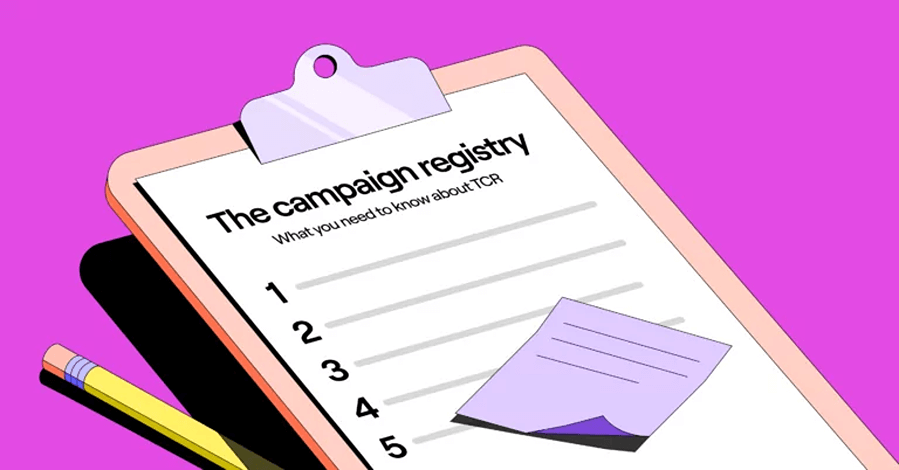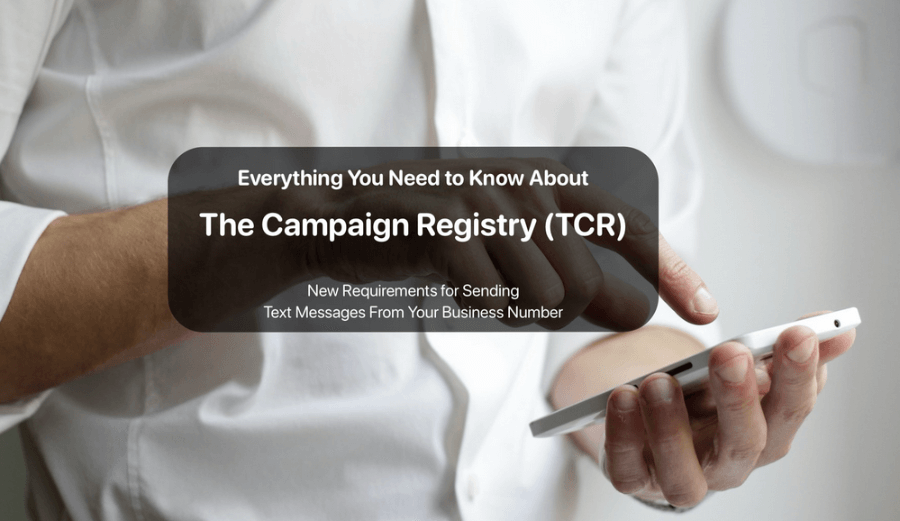📑 Table of Contents
As businesses embrace SMS marketing, ensuring compliance with regulations becomes critical. Enter The Campaign Registry (TCR), a pivotal component of modern business text messaging. But what exactly is TCR, and why does it matter for your campaigns? This guide unpacks everything you need to know about TCR and its impact on your SMS efforts.
What is The Campaign Registry?
The Campaign Registry (TCR) is an industry-wide database that oversees the registration of Application-to-Person (A2P) messaging campaigns for 10-digit long codes (10DLC). It ensures that SMS campaigns align with carrier and regulatory requirements, enhancing trust and transparency across the messaging ecosystem.
Carriers like Verizon and AT&T use TCR to evaluate and approve SMS campaigns. By registering through TCR, businesses prove that their campaigns are legitimate and comply with rules for texting consumers. This step improves message delivery rates and reduces the chances of being flagged as spam.
Key Terms to Know:
- 10DLC: A 10-digit long code used for A2P messaging, designed for high-volume business texting.
- Campaign Registration: The process of submitting your business details and campaign purpose to TCR.
- Carriers: Mobile network operators that deliver SMS messages to consumers.
Why TCR Matters for Businesses
Compliance is non-negotiable when it comes to SMS marketing. The Campaign Registry plays a crucial role in ensuring your business texts reach their audience without interruptions.
Benefits of TCR Registration:
- Enhanced Message Delivery: Messages sent through registered campaigns are more likely to reach consumers.
- Increased Trust: Carriers trust registered campaigns, reducing the chances of messages being flagged as spam.
- Regulatory Compliance: TCR ensures that campaigns adhere to laws like the Telephone Consumer Protection Act (TCPA).
- Access to 10DLC Benefits: Registered campaigns can use high-volume 10DLC numbers, ideal for scaling SMS marketing.
Consequences of Non-Compliance:
- Blocked Messages: Non-registered campaigns risk high message failure rates.
- Penalties: Failing to comply with carrier or regulatory requirements can lead to fines.
- Damaged Reputation: Spam-like messaging practices harm your brand’s credibility.
Beyond these immediate effects, non-compliance can lead to more long-term issues, such as strained relationships with carriers and decreased customer trust. It’s a risk no business should take lightly, especially as SMS marketing continues to grow as a key communication tool.
How TCR Works
The TCR process might seem complex, but understanding the steps can make it manageable. Here’s how it works:
- Brand Registration:
- Businesses must first register their brand with TCR. This includes providing details like the business name, industry, and contact information.
- Accurate details here are crucial, as errors can delay the registration process.
- Campaign Submission:
- Once the brand is registered, you submit each campaign with details such as the purpose (e.g., marketing, customer support) and messaging content.
- Be specific about your campaign goals and messaging structure to meet carrier expectations.
- Carrier Approval:
- Carriers evaluate your submission. They may request additional information or adjustments to meet compliance standards.
- This step ensures that your messages align with guidelines for consumer protection and transparency.
- Campaign Activation:
- Approved campaigns are activated, and your SMS provider can start sending messages on your behalf.
- Activation allows for consistent monitoring to ensure compliance over time.
Common Challenges and Solutions:
- Delays in Approval: Ensure your submission is complete and accurate to avoid setbacks. Missing information is one of the most common reasons for delays.
- Rejection by Carriers: Work with your SMS provider to address carrier feedback and resubmit promptly. Providers often have insights into common pitfalls and can guide you through corrections.
Additionally, staying proactive in monitoring your campaigns post-activation can prevent issues before they escalate. Regular reviews and updates ensure ongoing compliance and performance optimization.
Best Practices for TCR Compliance

TCR compliance doesn’t end with registration. Following best practices ensures your campaigns run smoothly and remain effective.
- Use Clear Messaging: Avoid misleading or vague text. Transparency builds trust and keeps carriers happy.
- Obtain Consent: Always secure consumer opt-ins before sending messages. This is not just good practice but a legal requirement under laws like TCPA.
- Monitor Campaigns: Regularly review delivery rates and carrier feedback to identify issues early. Metrics can reveal potential compliance or quality problems.
- Keep Information Updated: Ensure your registered details match your current business and campaign practices. Changes in your messaging approach may require updates to your TCR submission.
- Partner with Experts: Work with reputable SMS providers familiar with TCR requirements. Their experience can help you navigate complexities and stay compliant.
Pro Tip: Test your campaigns thoroughly before scaling. Small test batches can highlight issues that might not appear in large-scale messaging.
FAQs About The Campaign Registry
Here are answers to common questions about TCR:
1. Do all businesses need to register with TCR?
Yes, if your business uses A2P messaging on 10DLC numbers, registration is mandatory. Without registration, your messages may not be delivered effectively.
2. How much does TCR registration cost?
Costs vary depending on your SMS provider and the type of campaign you’re registering. Expect fees for brand and campaign registration. Some providers offer bundled pricing to simplify the process.
3. How long does approval take?
Approval times vary but typically range from a few days to a week. Complex campaigns or incomplete submissions can extend this timeline.
4. Can I register multiple campaigns?
Yes, you can register as many campaigns as needed under your brand. Each campaign must detail its purpose and comply with specific guidelines.
5. What happens if my campaign gets rejected?
Work with your SMS provider to address carrier feedback and resubmit your campaign. Most rejections are due to incomplete or unclear information, which can be corrected.
6. Are there penalties for non-compliance?
Yes, non-compliance can result in blocked messages, fines, and even loss of access to SMS platforms. Staying proactive with TCR helps avoid these risks.

Final Thought
The Campaign Registry is the backbone of compliant and effective SMS marketing. By registering your brand and campaigns, you unlock better message delivery rates, increased trust, and regulatory compliance. Don’t leave your SMS strategy to chance. Register with TCR and build a foundation for success.
Ready to streamline your SMS campaigns? Start your TCR registration today and stay ahead in the competitive world of business messaging.
In a world where customer communication is key, TCR ensures your messages are not only delivered but also trusted. Secure your spot in the messaging landscape by aligning your campaigns with TCR standards. It’s not just about compliance—it’s about ensuring your voice reaches your audience effectively and reliably.
